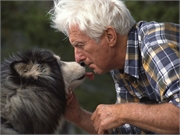No, Your Dog Doesn't Really Prefer Your Face, Brain Scans Show

THURSDAY, Oct. 8, 2020 (HealthDay News) -- You may think your dog is gazing lovingly at your face, but a new study suggests that's not the case.
Hungarian researchers say dogs' brains may not process faces the same way human brains do.
Faces are such an important part of communication for humans and other primates that faces have a special status in the visual system, and areas in the human brain are specifically activated by faces.
But this study found that dogs don't have specific face areas in their brains.
The researchers, led by Nóra Bunford of Eötvös Loránd University in Budapest, used magnetic imaging to compare the brain activity of 30 humans and 20 pet dogs as they watched brief videos of people and dogs.
The results revealed that human brains had a preference for faces. Some visual areas of human brains showed greater activity in response to a face than to the back of someone's head. Some of these brain regions also displayed species preference, with increased activity in response to seeing a human compared to a dog.
In contrast, dog brains only showed species preference. There was greater activity when they saw a dog than a person, and there was no difference in brain activity when dogs saw a face than when they saw the back of a head.
The findings were published Oct. 5 in the journal JNeurosci.
More information
For more on pet-human bonds, visit Pet Partners.

The news stories provided in Health News and our Health-E News Newsletter are a service of the nationally syndicated HealthDay® news and information company. Stories refer to national trends and breaking health news, and are not necessarily indicative of or always supported by our facility and providers. This information is provided for informational and educational purposes only, and is not intended to be a substitute for medical advice, diagnosis, or treatment.

